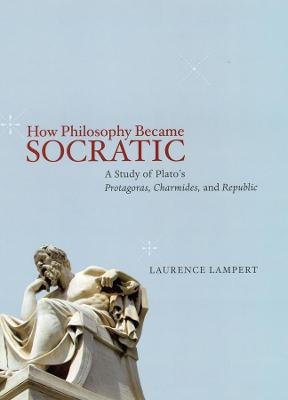
How Philosophy Became Socratic
A Study of Plato's "Protagoras," "Charmides," and "Republic"
Seiten
2010
University of Chicago Press (Verlag)
978-0-226-47096-2 (ISBN)
University of Chicago Press (Verlag)
978-0-226-47096-2 (ISBN)
Plato's dialogues show Socrates at different ages, beginning when he was about nineteen and already deeply immersed in philosophy and ending with his execution five decades later. This title investigates the evolution of Socrates' philosophy. It charts Socrates' gradual discovery of a proper politics to shelter and advance philosophy.
Plato's dialogues show Socrates at different ages, beginning when he was about nineteen and already deeply immersed in philosophy and ending with his execution five decades later. By presenting his model philosopher across a fifty-year span of his life, Plato leads his readers to wonder: does that time period correspond to the development of Socrates' thought? In this magisterial investigation of the evolution of Socrates' philosophy, Laurence Lampert answers in the affirmative. The chronological route that Plato maps for us, Lampert argues, reveals the enduring record of philosophy as it gradually took the form that came to dominate the life of the mind in the West. The reader accompanies Socrates as he breaks with the century-old tradition of philosophy, turns to his own path, gradually enters into a deeper understanding of nature and human nature, and discovers a successful way to transmit his wisdom to the wider world.
Focusing on the final and most prominent step in that process and offering detailed textual analysis of Plato's "Protagoras", "Charmides", and "Republic", "How Philosophy Became Socratic" charts Socrates' gradual discovery of a proper politics to shelter and advance philosophy.
Plato's dialogues show Socrates at different ages, beginning when he was about nineteen and already deeply immersed in philosophy and ending with his execution five decades later. By presenting his model philosopher across a fifty-year span of his life, Plato leads his readers to wonder: does that time period correspond to the development of Socrates' thought? In this magisterial investigation of the evolution of Socrates' philosophy, Laurence Lampert answers in the affirmative. The chronological route that Plato maps for us, Lampert argues, reveals the enduring record of philosophy as it gradually took the form that came to dominate the life of the mind in the West. The reader accompanies Socrates as he breaks with the century-old tradition of philosophy, turns to his own path, gradually enters into a deeper understanding of nature and human nature, and discovers a successful way to transmit his wisdom to the wider world.
Focusing on the final and most prominent step in that process and offering detailed textual analysis of Plato's "Protagoras", "Charmides", and "Republic", "How Philosophy Became Socratic" charts Socrates' gradual discovery of a proper politics to shelter and advance philosophy.
Laurence Lampert is emeritus professor of philosophy at Indiana University - Purdue University Indianapolis. He is the author of four books, including Leo Strauss and Nietzsche, also published by the University of Chicago Press, and Nietzsche and Modern Times: A Study of Bacon, Descartes, and Nietzsche.
| Erscheint lt. Verlag | 10.8.2010 |
|---|---|
| Sprache | englisch |
| Maße | 16 x 23 mm |
| Gewicht | 765 g |
| Themenwelt | Geisteswissenschaften ► Philosophie ► Philosophie Altertum / Antike |
| ISBN-10 | 0-226-47096-2 / 0226470962 |
| ISBN-13 | 978-0-226-47096-2 / 9780226470962 |
| Zustand | Neuware |
| Haben Sie eine Frage zum Produkt? |
Mehr entdecken
aus dem Bereich
aus dem Bereich
mit Sokrates, Seneca, Platon & Co. im Gespräch
Buch | Hardcover (2023)
FinanzBuch Verlag
18,00 €


